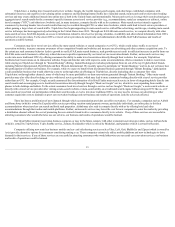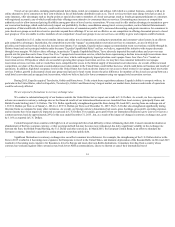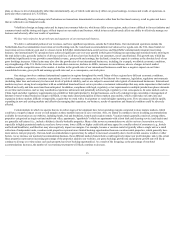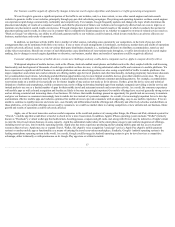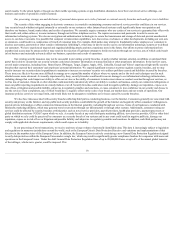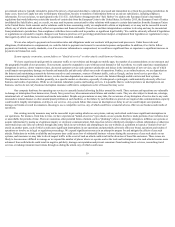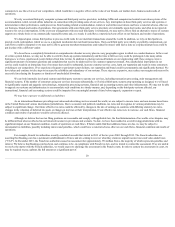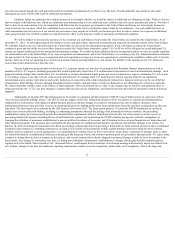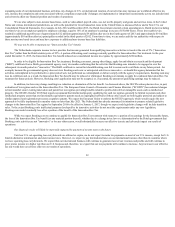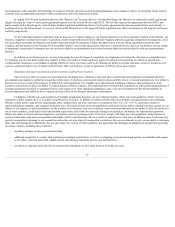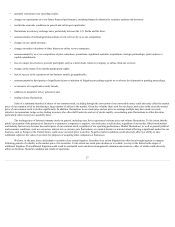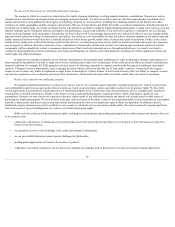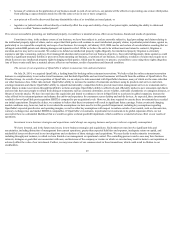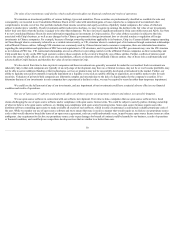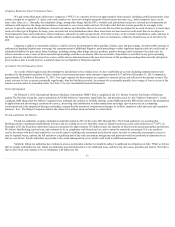Priceline 2015 Annual Report Download - page 26
Download and view the complete annual report
Please find page 26 of the 2015 Priceline annual report below. You can navigate through the pages in the report by either clicking on the pages listed below, or by using the keyword search tool below to find specific information within the annual report.
Adverse application of U.S. state and local tax laws could have an adverse effect on our business and results of operations.
A number of jurisdictions in the United States have initiated lawsuits against online travel companies, including us, related to, among other things, the
payment of travel transaction taxes (e.g., hotel occupancy taxes, excise taxes, sales taxes, etc.). In addition, a number of U.S. states, counties and municipalities
have initiated audit proceedings, issued proposed tax assessments or started inquiries relating to the payment of travel transaction taxes. Additional state and local
jurisdictions may assert that we are subject to, among other things, travel transaction taxes and could seek to collect such taxes, either retroactively or
prospectively, or both.
In connection with some travel transaction tax audits and assessments, we may be required to pay any assessed taxes, which amounts may be substantial,
prior to being allowed to contest the assessments and the applicability of the laws in judicial proceedings. This requirement is commonly referred to as "pay to
play" or "pay first." Payment of these amounts, if any, is not an admission that we believe that we are subject to such taxes and, even if we make such payments,
we intend to continue to assert our position that we should not be subject to such taxes.
Litigation is subject to uncertainty and there could be adverse developments in these pending or future cases and proceedings. Adverse tax decisions could
have a material adverse effect on our business, margins and results of operations. An unfavorable outcome or settlement of pending litigation may encourage the
commencement of additional litigation, audit proceedings or other regulatory inquiries. In addition, an unfavorable outcome or settlement of these actions or
proceedings could result in substantial liabilities for past and/or future bookings, including, among other things, interest, penalties, punitive damages and/or
attorneys' fees and costs.
In many of the judicial and other proceedings initiated to date, the taxing jurisdictions seek not only historical taxes that are claimed to be owed on our
gross profit, but also, among other things, interest, penalties, punitive damages and/or attorneys' fees and costs. Therefore, any liability associated with travel
transaction tax matters is not constrained to our liability for tax owed, but may also include, among other things, penalties, interest and attorneys' fees. To date, the
majority of the taxing jurisdictions in which we facilitate travel reservations have not asserted that taxes are due and payable on our travel services. With respect to
taxing jurisdictions that have not initiated proceedings to date, it is possible that they will do so in the future or that they will seek to amend their tax statutes and
seek to collect taxes from us only on a prospective basis.
We are dependent on providers of accommodations, rental cars and airline tickets and on restaurants.
We rely on providers of accommodations, rental cars and airline tickets and on restaurants to make their services available to consumers through us. Our
arrangements with travel service providers generally do not require them to make available any specific quantity of accommodation reservations, rental cars or
airline tickets, or to make accommodation reservations, rental cars or airline tickets available in any geographic area, for any particular route or at any particular
price. Similarly, our arrangements with restaurants generally do not require them to provide all of their available tables and reservations to customers through us.
During the course of our business, we are in continuous dialogue with our major travel service providers about the nature and extent of their participation in our
services. A significant reduction on the part of any of our major travel service providers or providers that are particularly popular with consumers in their
participation in our services for a sustained period of time or their complete withdrawal could have a material adverse effect on our business, market share and
results of operations. To the extent any of those major or popular travel service providers ceased to participate in our services in favor of one of our competitors'
systems or decided to require consumers to purchase services directly from them, our business, market share and results of operations could be harmed. Further, as
consolidation among travel service providers increases, the potential adverse effect of a decision by any particular significant travel service provider (such as a
large hotel chain, airline or rental car company) to withdraw from or reduce its participation in our services also increases. To the extent restaurants limit the
availability of reservations through OpenTable, consumers may not continue to use our services and/or our revenues could be adversely affected, especially if
reservations during highly desirable times on high volume days are not made available through us.
Further, KAYAK, a meta-search service, depends on access to information related to travel service pricing, schedules, availability and other related
information from OTCs and travel service providers to attract consumers. To obtain this information, KAYAK maintains relationships with travel service providers
and OTCs. Many of KAYAK's agreements with travel service providers and OTCs are short-term agreements that may be terminated on 30 days' notice. To the
extent OTCs or travel service providers no longer provide such information to KAYAK, KAYAK's ability to provide comprehensive travel service information to
consumers could be diminished and its brand, business and results of operations could be harmed. To the extent consumers do not view KAYAK as a reliable
source of comprehensive travel service information, fewer consumers would likely visit its websites, which would also likely have a negative impact on KAYAK's
advertising revenue and results of operations. In addition, if travel service providers or OTCs choose not to advertise with KAYAK or choose to reduce or
23


